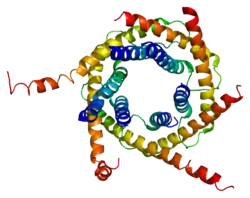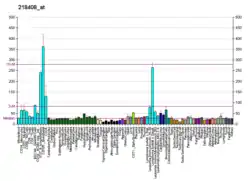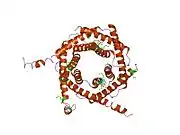TIMM10
Mitochondrial import inner membrane translocase subunit Tim10 is an enzyme that in humans is encoded by the TIMM10 gene.[5][6]
TIMM10 belongs to a family of evolutionarily conserved proteins that are organized in heterooligomeric complexes in the mitochondrial intermembrane space. These proteins mediate the import and insertion of hydrophobic membrane proteins into the mitochondrial inner membrane.[supplied by OMIM][6]
References
- GRCh38: Ensembl release 89: ENSG00000134809 - Ensembl, May 2017
- GRCm38: Ensembl release 89: ENSMUSG00000027076 - Ensembl, May 2017
- "Human PubMed Reference:". National Center for Biotechnology Information, U.S. National Library of Medicine.
- "Mouse PubMed Reference:". National Center for Biotechnology Information, U.S. National Library of Medicine.
- Jin H, Kendall E, Freeman TC, Roberts RG, Vetrie DL (Feb 2000). "The human family of Deafness/Dystonia peptide (DDP) related mitochondrial import proteins". Genomics. 61 (3): 259–67. doi:10.1006/geno.1999.5966. PMID 10552927.
- "Entrez Gene: TIMM10 translocase of inner mitochondrial membrane 10 homolog (yeast)".
Further reading
- Koehler CM, Jarosch E, Tokatlidis K, et al. (1998). "Import of mitochondrial carriers mediated by essential proteins of the intermembrane space". Science. 279 (5349): 369–73. doi:10.1126/science.279.5349.369. PMID 9430585.
- Bauer MF, Rothbauer U, Mühlenbein N, et al. (2000). "The mitochondrial TIM22 preprotein translocase is highly conserved throughout the eukaryotic kingdom". FEBS Lett. 464 (1–2): 41–7. doi:10.1016/S0014-5793(99)01665-8. PMID 10611480. S2CID 27484018.
- Rothbauer U, Hofmann S, Mühlenbein N, et al. (2001). "Role of the deafness dystonia peptide 1 (DDP1) in import of human Tim23 into the inner membrane of mitochondria". J. Biol. Chem. 276 (40): 37327–34. doi:10.1074/jbc.M105313200. PMID 11489896.
- Vial S, Lu H, Allen S, et al. (2002). "Assembly of Tim9 and Tim10 into a functional chaperone". J. Biol. Chem. 277 (39): 36100–8. doi:10.1074/jbc.M202310200. PMID 12138093.
- Strausberg RL, Feingold EA, Grouse LH, et al. (2003). "Generation and initial analysis of more than 15,000 full-length human and mouse cDNA sequences". Proc. Natl. Acad. Sci. U.S.A. 99 (26): 16899–903. doi:10.1073/pnas.242603899. PMC 139241. PMID 12477932.
- Allen S, Lu H, Thornton D, Tokatlidis K (2003). "Juxtaposition of the two distal CX3C motifs via intrachain disulfide bonding is essential for the folding of Tim10". J. Biol. Chem. 278 (40): 38505–13. doi:10.1074/jbc.M306027200. PMID 12882976.
- Mühlenbein N, Hofmann S, Rothbauer U, Bauer MF (2004). "Organization and function of the small Tim complexes acting along the import pathway of metabolite carriers into mammalian mitochondria". J. Biol. Chem. 279 (14): 13540–6. doi:10.1074/jbc.M312485200. PMID 14726512.
- Gerhard DS, Wagner L, Feingold EA, et al. (2004). "The status, quality, and expansion of the NIH full-length cDNA project: the Mammalian Gene Collection (MGC)". Genome Res. 14 (10B): 2121–7. doi:10.1101/gr.2596504. PMC 528928. PMID 15489334.
- Webb CT, Gorman MA, Lazarou M, et al. (2006). "Crystal structure of the mitochondrial chaperone TIM9.10 reveals a six-bladed alpha-propeller". Mol. Cell. 21 (1): 123–33. doi:10.1016/j.molcel.2005.11.010. PMID 16387659.
- Carey KA, Segal D, Klein R, et al. (2006). "Identification of novel genes expressed during rhabdomyosarcoma differentiation using cDNA microarrays". Pathol. Int. 56 (5): 246–55. doi:10.1111/j.1440-1827.2006.01958.x. PMID 16669873. S2CID 29365940.
This article is issued from Wikipedia. The text is licensed under Creative Commons - Attribution - Sharealike. Additional terms may apply for the media files.






